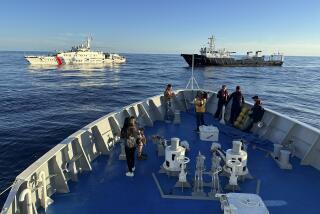Japan Blocks Flotilla Claiming Islands for China
HONG KONG — Japan on Monday asserted its claim to a chain of disputed islands by blocking a flotilla of Taiwanese and Hong Kong demonstrators who tried to land on the stony outposts to plant the flags of Taiwan and the People’s Republic of China.
According to reporters aboard the seven small vessels containing anti-Japanese activists, the demonstrators were turned back by Japanese coast guard craft before they could land on the tiny, uninhabited islands located 100 miles northeast of Taiwan in the East China Sea.
Japan, China and Taiwan all claim the rocky archipelago, known in Japanese as the Senkaku Islands and in Chinese as the Diaoyutai. A lighthouse put up there by Japanese ultranationalists in July has sparked anti-Japanese demonstrations in Taiwan and Hong Kong and has emerged as a beacon for Chinese nationalists around the world.
Albert Ho, a Hong Kong legislator aboard a ship turned away by the Japanese, said before the trip that the protesters hoped to force a showdown between the Chinese and Japanese governments. “This trip is planned to escalate the matter to a higher level so that both governments can’t afford to ignore it,” he told Hong Kong television reporters as he boarded a 60-foot ship in Taiwan on Sunday.
Chinese officials say Foreign Minister Qian Qichen will address the issue with his Japanese counterpart, Yukihiko Ikeda, today at the U.N. General Assembly in New York.
Despite both governments’ attempts to downplay the conflict--their first direct territorial clash since World War II--popular sentiment remains high in China, Hong Kong and Taiwan against perceived Japanese militarism.
Determined to create a confrontation, Hong Kong and Taiwanese activists have planned a series of attempts to tear down the Japanese lighthouse and replace the Japanese flag with a Chinese one.
A rusting tanker carrying another group of Hong Kong protesters is expected to reach the islands early Wednesday; two fresh waves of Chinese patriots will follow in the next two weeks, including 40 paroled Taiwanese convicts vowing to sacrifice their lives. Japanese officials had already turned away three boats before Monday’s landing attempt.
One Hong Kong man preparing to leave on the boat that will arrive Wednesday said he would rather not die for the cause but that it was important to face the Japanese group’s challenge. “We are going to show the world how angry we are,” said Angus Chan, 28. “We want to fight for our island.”
Just over 100 years since China lost the islands to Japan, and 65 years after Japan invaded northern China, Chinese all over Asia took to the streets to vent their rage at a Japan that has only recently apologized for long-denied war atrocities.
In Hong Kong, where the anniversary of the invasion was commemorated Sept. 15, 12,000 people marched, chanting anti-Japanese slogans and even storming Japanese department stores.
In Shenyang, China, where the first Japanese invasions occurred, citizens fell silent while a siren wailed on the Sept. 18 anniversary. In Beijing, nearly 100 guards surrounded the Japanese Embassy for the day. On Sunday, as the ships prepared to sail from Taiwan’s southern port of Chilung, 15,000 supporters paraded in Taipei, some flogging an effigy of the Japanese prime minister.
“We’ve been fighting Japanese militarism for a long time,” said Au Pak Kuen, 49, a Hong Kong teacher who first protested the Japanese possession of the disputed islands in 1971, when the United States handed them back to Japan along with Okinawa. “We have to settle this issue before the wartime generation vanishes and the new generation forgets.”
The issue of who owns the islands--further fueled by suspected oil reserves beneath them--has created an unlikely coalition of Chinese in Hong Kong, Taiwan, China and the United States, their usual political divisions superseded by their shared anti-Japanese sentiment.
In Hong Kong, protesters who had burned the five-starred Chinese flags at a Tiananmen Square massacre memorial gathering on June 4 were waving them last week in patriotic fury. One prominent democracy activist who had picketed China’s de facto embassy hundreds of times was welcomed inside for the first time when he came to present a petition about the islands.
But after an initial flurry of critical newspaper articles and a strong official protest earlier this month when Japanese right-wing activists repaired the lighthouse, Beijing has urged restraint.
While anti-Japanese demonstrations raged in Hong Kong and Taiwan, the mainland Chinese government denied requests from student and other groups to stage public protests. Security has remained especially heavy in the last week around the Japanese Embassy in the Chinese capital.
Five leaders heading a petition drive to protest Japanese possession of the islands were ordered by the government to leave Beijing. One of the banished petitioners, Tong Zeng, said the government accused him of “interfering in foreign affairs and affecting anti-Japanese relations.”
But the main reason for the ban, a Western diplomat in Beijing speculated, was the government fear that a protest might veer off in an unwanted direction.
Farley reported from Hong Kong and Tempest from Beijing.
More to Read
Sign up for Essential California
The most important California stories and recommendations in your inbox every morning.
You may occasionally receive promotional content from the Los Angeles Times.










